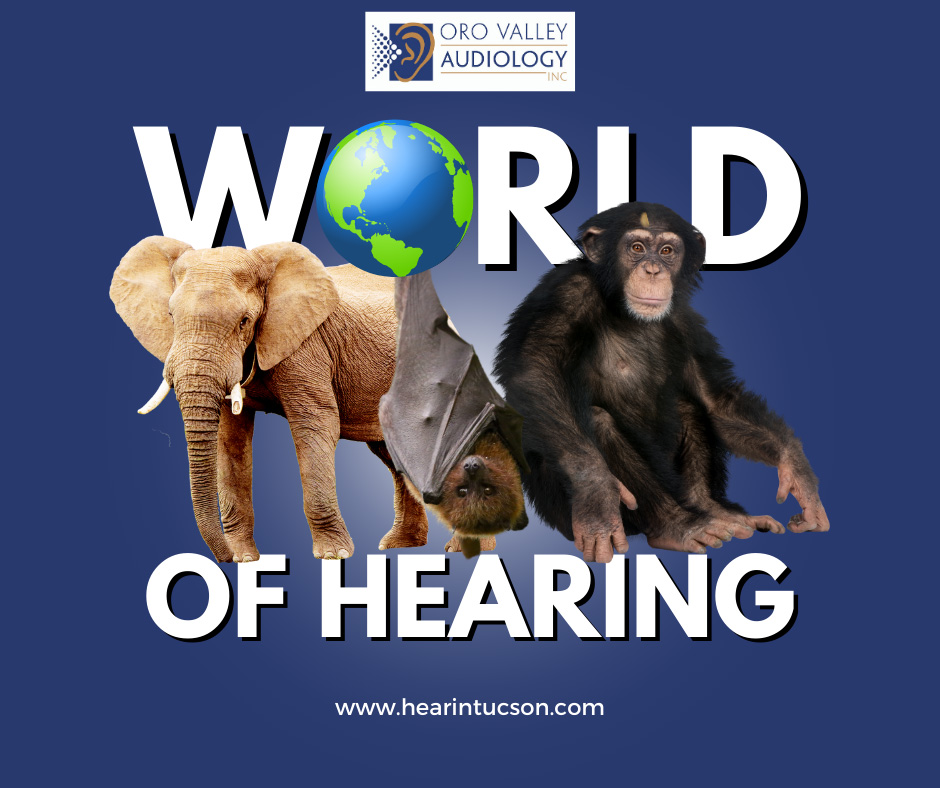Last year we discussed how humans hear – a complex system of converting soundwaves to fluid waves, then to electrical energy. Of course, hearing is not unique to humans. Most mammals hear in a similar way to humans (ear canal, ear drum, bones, and inner ear) and others hear in completely different ways. So, what are some of the different ways animals hear?
Elephants are known to have fantastic hearing. Though their ears work in much the same way as ours, due to the large size of the external portion of their ears, they can collect significantly more sound than humans. This allows them to hear many soft sounds which humans cannot detect. They also have extra nerve endings in their feet which help to pick up vibrations from the ground. Between these two sources of hearing, elephants can hear very low bass sounds. Their hearing is so sensitive that they can even detect sounds from several miles away. Because of this, elephants can communicate across large distances with the simple stomp of their feet.
Bats are known for their echolocation – a highly accurate use of the reflection of high pitch sounds that allows them to determine where insects are in the space around them – even in complete darkness. They also have large ears, like elephants, to help them detect these sounds. Amazingly, however, bats don’t just use their ears to pick up the movements of the insects but also have special nerves which are very sensitive to air movement. These are called “Merkel Hairs” and are located on their wings. Bats use the air movement detected by these nerves on their wings and their echolocation abilities to hunt with precision for insects.
Dolphins have ears but, unlike humans, they are not solely dependent on their ears for hearing. A dolphin can feel pulses of sound through their forehead and their jaws. This allows them to pick up sounds from a good distance away. They also use this extra hearing sense for their echolocation. When they produce a high frequency signal, it bounces off an object or animal and is felt by their forehead and jaw. This ability is so refined, dolphins can even determine the distance, shape, size, and even texture of the object based on the nature of the echo – something no human can do with just our ears!
Even most insects can hear. Some insects have a membrane similar to the human eardrum called a tympani. This vibrates with sound which, something called the chordotonal organ, converts to a nerve impulse. Many insects we hear, such as crickets and cicadas, have such mechanisms. Other insects use sensory cells in the middle of their antennae to hear, called the Johnston’s organ. Mosquitos, bees, and fruit flies are insects that hear with their antennae. Hawkmoths even have a special organ in their mouths that give them the ability to hear ultrasonic sounds and avoid predators, such as bats. It’s incredible to see the variety of mechanisms used to hear by animals and insects!
In most cases, animals and insects have better hearing capabilities than humans, particularly in terms of the range of sounds that can be heard. Humans, when first born, can hear from the range of 20 Hz up to around 20,000 Hz. Over time, however, this range shrinks so that most adults can’t hear much over 14,000 Hz. Elephants can hear lower frequencies down to about 14 Hz while bats can hear sounds up to 200,000 Hz.
Although animals typically can hear sounds better than humans, we have a distinct advantage – we can take otherwise meaningless sounds produced by a mouth (speech) and turn them into useable information. We have a complex language system based simply on sounds put together to form words, which form sentences and, ultimately, allow us to convey ideas to one another. This is a distinctly human trait that opens our worlds up to compassion, understanding, and relationships. This also means that a loss of hearing for humans can greatly impact our relationships.
If you or someone you know is noticing that relationships are beginning to suffer because of challenges with hearing, please give our office a call. We would love to help you determine whether you have hearing loss and if there are options available to help you restore those challenged relationships.
Source: Hadley, Debbie. “How Do Insects Hear?” ThoughtCo, ThoughtCo, 19 Apr. 2018, https://www.thoughtco.com/how-do-insects-hear-1968479#:~:text=Not%20only%20do%20insects%20hear,avoid%20being%20eaten%20by%20them.


